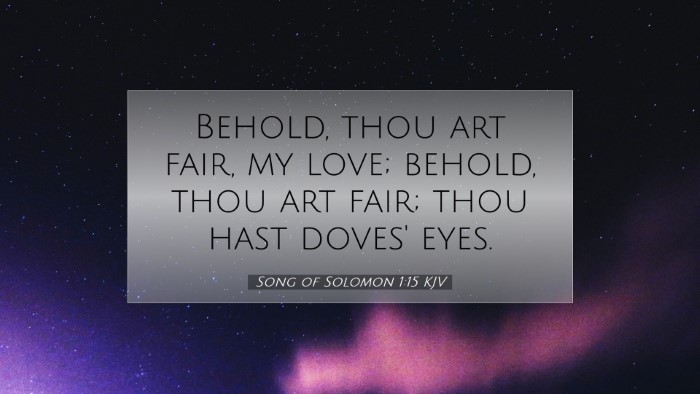Commentary on Song of Solomon 1:15
Bible Verse: "Behold, thou art fair, my love; behold, thou art fair; thou hast dove's eyes."
Introduction
The Song of Solomon, also known as the Song of Songs, is a poetic exploration of love and desire, often interpreted as an allegorical representation of the relationship between Christ and the Church or between God and His people. In this context, Song of Solomon 1:15 offers rich insights into the beauty and characteristics of love.
Exegesis of Song of Solomon 1:15
This verse presents a direct address from the beloved (the bride) to the lover (the bridegroom). It is a declaration of admiration and beauty that holds profound theological significance. As we examine this verse, we will draw from classical commentaries to unravel its meaning.
Matthew Henry's Commentary
Matthew Henry notes the repeated phrase "thou art fair," emphasizing the beauty of the beloved. He suggests that this beauty is not merely superficial but reflects a deeper moral and spiritual attractiveness. Henry posits that the 'dove's eyes' serve as a metaphor for purity and simplicity, qualities cherished in both human relationships and divine love.
- Beauty and Purity: The reference to 'dove's eyes' suggests a gentle, innocent beauty, aligning with the Christian understanding of purity in love. This signifies a call to holiness in relationships.
- Reflection of God’s Love: Just as the bridegroom finds beauty in the bride, so too does God see beauty in His people, a reminder of His redeeming grace.
Albert Barnes' Commentary
Albert Barnes emphasizes the poetic nature of this verse, interpreting "dove's eyes" as a symbol of clarity, vision, and focus. He argues that this imagery highlights the grace and gentleness of the beloved, drawing a parallel to the characteristics that the faithful should embody.
- Qualities of the Beloved: Barnes asserts that the attributes of the beloved can serve as a model for believers in their quest for holiness and purity.
- Christological Implications: The beauty of the beloved is indicative of the Church’s beauty as described in the New Testament — a beauty wrought by grace.
Adam Clarke's Commentary
Adam Clarke provides a linguistic and cultural analysis, noting that the term 'fair' in Hebrew conveys a sense of brightness and attractiveness. He elaborates on the significance of 'dove's eyes,' suggesting that doves are recognized for their peaceful nature and loyal bonding behaviors. Clarke views the reference to the beloved's eyes as emblematic of faithfulness and affection.
- Cultural Context: Understanding the significance of doves in ancient culture, Clarke highlights their associations with love and fidelity, reflecting the ideal qualities in romantic relationships.
- Faithfulness as a Theme: This emphasis on the dove’s characteristics prepares the reader for deeper themes of faithfulness and commitment inherent in the love story of the Song of Solomon.
Theological Implications
Throughout these commentaries, several theological implications arise from Song of Solomon 1:15 that are vital for pastors, students, and scholars:
- Understanding Divine Love: The beauty and purity associated with the beloved offer a glimpse into the nature of divine love and grace. It suggests that true love reflects God’s character.
- Call to Reflect Beauty: The call to recognize and embrace the beauty within ourselves and our relationships echoes the Biblical principle of being created in the image of God, urging believers to cultivate characteristics that reflect His glory.
- Inspiration for Worship: This scripture can inspire heartfelt worship, as believers recognize their own beauty in the eyes of God and respond with adoration and devotion.
Practical Applications
For pastors, students, and scholars, the verse offers several practical applications:
- Marriage and Relationships: It serves as a reminder of the beauty found in mutual admiration and respect within romantic relationships, calling for an appreciation of the uniqueness of one’s partner.
- Personal Development: Individuals are encouraged to cultivate inner beauty, fostering attributes like purity and faithfulness that resonate with spiritual growth.
- Community Reflection: The beauty of the Church collectively reflects the attributes mentioned in the verse, challenging congregations to embody love and purity in their communal life.
Conclusion
Song of Solomon 1:15 encapsulates profound truths about love, beauty, and divine grace. The insights gathered from the commentaries of Matthew Henry, Albert Barnes, and Adam Clarke illuminate the text's richness and depth. This verse not only speaks to the relationship between lovers but also invites us to reflect on our relationship with God, encouraging us to strive for a beauty that reflects His love and grace.


